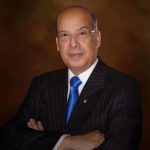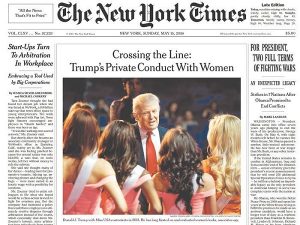
Dr. Sir Ronald Sanders former Caribbean diplomat
Reporters Without Borders (RWB) just released its 2018 press freedom report, and, apart from two of them, the lowest mark for rated Caribbean Community (CARICOM) countries is “fairly good”. The worst rated, as “problematic”, are Haiti and Guyana. Jamaica is the only CARICOM country rated “good”.
For unknown reasons, the Bahamas and Barbados are not included among the 180 countries that were assessed.
In between the extremes of Jamaica on the top end, and Haiti and Guyana on the other end, Suriname, Belize, Trinidad and Tobago and, collectively, the six countries of the Organisation of Eastern Caribbean States (OECS) are scored as “fairly good”.
There are two further categories “bad”, and “very bad”, but no CARICOM country is included in them.
Based in Paris, RWB describes itself as an independent non-governmental organisation with consultative status to the United Nations, UNESCO, the Council of Europe and the International Organization of the Francophonie. It says that it was founded by four journalists in the southern French city, Montpellier, in 1985 and is now one of the world’s leading NGOs in the defence and promotion of freedom of information.
RWB has been producing the World Press Freedom Index for a number of years and it claims that, “as an evaluation and advocacy tool, the Index is increasingly used by such bodies as the UN Refugee Agency, the World Bank, and the Millennium Challenge Corporation in determining the allocation of development aid”.
If the latter claim is true, Caribbean Governments should pay greater attention to the Index than they have in the past, particularly as the methodology used by RWB for rating countries lacks clarity and fatal miscalculations could be made.
For instance, RWB says that “the degree of freedom available to journalists in 180 countries is determined by pooling the responses of experts to 87 questions”. The questionnaire is targeted to “media professionals, lawyers and sociologists” and “scores are calculated on the basis of the responses of the experts selected by RWB, combined with data on abuses and violence against journalists during the period evaluated”.

Photo courtesy https://www.cnsnews.com
While RWB claims that teams of specialists, assigned to different geographical regions, “keep a detailed tally of abuses and violence against journalists and media outlets”, it provides no details of the sources for the data.
The current report is awkward for the CARICOM region, because two countries are omitted from it and the OECS six are lumped together as if each of their media and all their journalists exist and operate in an identical environment.
If the RWB report is to be taken seriously in the Caribbean it would have to cover the area better than it has in this report, and its methodology would have to be far more detailed and transparent than it is. As an example, it would have been useful if it had identified the institutions that provided the lawyers, sociologists and media specialists who answered the 87-questions in each of the CARICOM countries that are rated.
It would also be constructive to know how a tally of abuse and violence against journalists in these countries was compiled.
In the event, there is reason for satisfaction with the RWB report by 9 of the 14 CARICOM countries. Of the 180 states in the report card, Jamaica at number 6, Suriname at 21, the collective OECS at 35, and Trinidad and Tobago at 39, rate better than the United States of America at 45. This suggests that the level of media freedom in these nine CARICOM countries is reasonably high if the methodology is uniform and the measurements accurate.
Other CARICOM countries, Belize at 47, Guyana at 55 and Haiti at 60 would appear to have improvements to make if the RWB report is correct.
Having said all that, RWB has done remarkable work in trying to maintain and improve media freedom, particularly in countries run by despots and tyrants and those who are increasingly less tolerant of media, including non-traditional ones.
The organisation has drawn attention to assassinations of journalists in India, Mexico and Brazil over the past year and to killings of two investigative reporters inside the European Union (one in Malta) which has long been considered the most media-friendly region.
It has also drawn attention to the United States where, it says, President DonaldTrump has been vocal in his antagonism to the press, calling reporters the “enemy of the people”. According to the RWB, “the lack of commitment by the U.S. government to one of the most precious democratic principles, is a key factor in the worsening situation facing media workers” and is a poor example to leaders in other countries who will feel emboldened to do the same.
CARICOM societies have come a long way in recognising the importance of media freedom, and people now resent one-sided information pedalled by both government-owned and privately-owned media.
In part, the public response to traditional media is due to the advent and spread of social media. Information spreads more rapidly on Whatsapp, Facebook and Instagram than any radio or television station can match, and far more rapidly than newspapers can deliver.
Also, social media provides opportunities for sharing information and for frank discussion by individuals. Therefore, it has a greater influence on opinion-formation than the traditional media.
All this still leaves room for good journalism in the Caribbean, provided it is “good”. Poor journalism degrades the profession, especially when owners of media – both state and private – coerce journalists into following their line rather than giving their audiences objective and unbiased analysis of events.
Good journalism also requires good journalists and objective and informed analysts, the fundamental criterion for whom is a capacity to pursue facts, weigh-up as many sides of an event as possible and deliver it to an audience only after being satisfied that the reportage is accurate, or the analysis is balanced.
Bad journalism is easily recognisable and quickly dismissed. On the other hand, good journalism is like a toothache; it hurts but it indicates that something is wrong and needs fixing.
(The writer is Antigua and Barbuda’s Ambassador to the US and the OAS. He is also a Senior Fellow at the Institute of Commonwealth Studies at the University of London and Massey College in the University of Toronto. The views expressed are his own)
Responses and previous commentaries: www.sirronaldsanders.com


